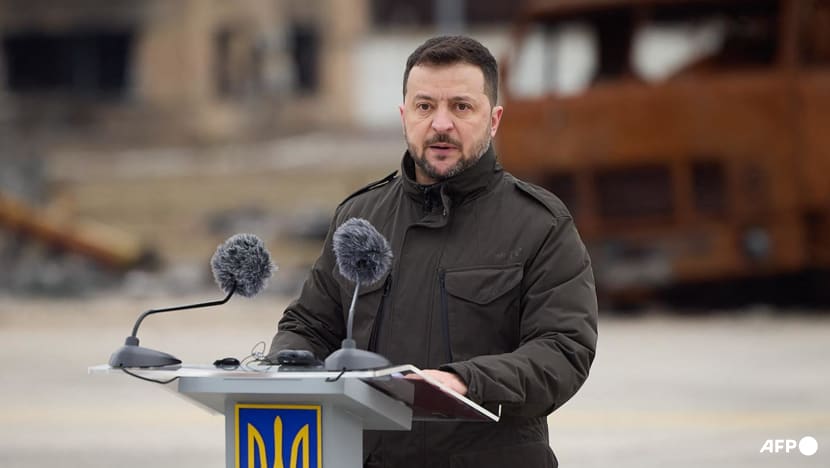Ukraine hopes to shore up support at its peace summit shunned by Russia, China
About 90 countries and international organisations have confirmed their participation at event in Switzerland over the weekend.

In this handout photograph taken and released by Ukrainian Presidential Press Service on Feb 24, 2024, Ukraine's President Volodymyr Zelenskyy speaks during a ceremony marking the second anniversary of the Russian invasion of Ukraine in Hostomel, Kyiv region. (Photo: Handout/UKRAINIAN PRESIDENTIAL PRESS SERVICE/AFP)

This audio is generated by an AI tool.
KYIV: Switzerland will host Ukraine’s peace summit this weekend, where Kyiv is hoping to shore up international support for its proposals and to pave the way for an end to the war with Russia on its terms.
About 90 countries and international organisations have confirmed their participation at the event which will be held on Saturday (Jun 15) and Sunday at the Buergenstock resort outside the city of Lucerne.
Moscow has not been invited after repeatedly dismissing the conference as pointless and making known its disinterest in attending.
Kyiv said it wants to draw up an internationally agreed upon roadmap towards ending the conflict from the upcoming meeting to bring to a second summit, which it wants Moscow to attend.
WHO IS ATTENDING?
French President Emmanuel Macron, German Chancellor Olaf Scholz, British Prime Minister Rishi Sunak, European Commission President Ursula von der Leyen, Canadian Prime Minister Justin Trudeau and Japan Prime Minister Fumio Kishida are among top leaders set to be in attendance.
However, analysts said the more important question is who is not attending.
China, which has close ties with Russia, will be absent from the event. Beijing said the presence of both warring parties is a prerequisite for any substantive peace conference. It has also been lobbying governments for its alternative peace plan.
United States President Joe Biden will not be in attendance due to his schedule, and will instead be sending Vice President Kamala Harris and National Security Adviser Jake Sullivan.
It is unclear if the rest of the BRICS grouping Brazil, India and South Africa will be sending delegations.
Observers said the summit lacks clout with the absence of key nations as well as heads of states.
Alexey Muraviev, associate professor of National Security and Strategic Studies at Curtin University, said he is unable to see any practical outcomes for the meeting.
“Some states, whilst formally attending the summit, are not sending their senior leaders who are key brokers. This lowers the level of potential impact that the summit was supposed to generate,” he told CNA’s Asia First on Friday.
FRESH OFF G7 SUMMIT
Ukraine’s global peace summit comes fresh off an ongoing gathering of the Group of Seven (G7) leaders in Italy.
During the meeting, Biden and Ukrainian President Volodymyr Zelenskyy inked a 10-year bilateral security agreement.
Muraviev said the pact is the Biden administration’s way of ensuring Washington’s continued support amid fears a change of guard in the White House following November’s presidential election could reverse US standing on Ukraine.
G7 leaders also agreed on a US$50 billion deal for Ukraine using interest generated by around US$300 billion worth of sovereign Russian assets frozen in Western countries.
The US has proposed seizing the assets outright but European nations have been more hesitant over legal and financial concerns.
Muraviev said tapping into the resource sets a precedent that has the potential to undermine investors’ confidence in western financial institutions if such assets could be seized and used.
“There was no established framework that would legitimise such use in the past. This is probably one of the first cases when somebody’s frozen sovereign assets would be used without explicit permission from the owner – basically violating international law,” he said.
He is pessimistic that the move, or more proposed sanctions, would sway Russia to halt its invasion of Ukraine.
“Given that the Russians have (already) survived a tsunami of sanctions, it's not going to be a massive dramatic turnaround for Moscow this time,” he said.
INTENSIFIED ASSAULTS ON UKRAINE
The Switzerland summit will take place against a backdrop of intensified Russian assaults on Ukraine.
In the past few months, attacks knocked out more than half the country’s power generating capacity, and a ground offensive in the northeast broke open a new war front.
Ukrainians are hoping the summit will unite countries in discussing what matters most to them – peace.
Kyiv is also hoping to frame the end of the war as something that matters not only to Ukraine, but also the rest of the world.
“The war that we have here is not only our Ukrainian war, and I hope that it will become more and more obvious for western politicians that it affects the whole of Europe, and maybe the whole world. Because the bad guys are observing how the US and other countries react,” said a Kyiv resident who only wanted to be known as Alina.
UKRAINE’S PEACE PLAN
Zelenskyy’s 10-point peace formula will take centre stage at the summit.
First announced in 2022, it includes the restoration of Ukraine’s territorial integrity, the total withdrawal of Russian troops, and to punish those guilty of war crimes.
The summit will also focus on three themes in the formula: nuclear safety, food security, and the release of Ukrainian captives and children deported to Russia – issues Ukrainian officials have cited as having the potential to unite countries with differing views.
Throughout the war, thousands of soldiers have been taken captive on both sides, and Kyiv is hoping to discuss an all-for-all prisoner exchange.
The United Nations said more than 16,000 Ukrainian children have been illegally taken to Russia.
It is unclear how effective the summit will be in finding a path to end the 27-month-old war, but Kyiv believes this is the first step in bringing as many countries together to showcase their commitment to peace.
















